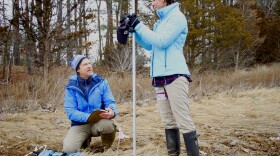The threat of climate change can be stressful for anyone, but for the climate scientists who study it day in and day out, that constant stress can take a toll on mental health.
Dr. Susanne Moser is a human geographer who specializes in psychological responses to climate change. She is a researcher out of Antioch University New England in Keene, and she recently co-authored a new paper titled "The Emotional Toll of Climate Change on Science Professionals."
NHPR’s All Things Considered host Peter Biello sat down with Moser to talk about the stress scientists face, and the strategies they can use to cope.
So you write that those who study climate science and those who are tasked with reporting bad news about climate change can experience, among other things, something called "climate grief." What is that?
Climate grief is the experience of sadness and loss in light of what we know about how the climate is already changing and what else is in the cards and what we might be losing in the future.
And why might it be harder for climate scientists to cope with these feelings than others?
Well, if you will, climate scientists have their finger on the pulse. They are every single day looking at the data, looking at what's already happening and then looking at projections of what is projected to occur in the future. And we're beginning to see what that means. And we know how much more is coming. So we're beginning to recognize it for the general public that they might have these types of reactions. But we have sort of ignored the people who look at this day in and day out. And that's what we tried to bring attention to with the article that we've just published.
So what are some strategies that people in this field can use to mitigate climate stress and other negative impacts?

Well, I think there are a number of different levels. So the first one is that we just talk about it. That we just actually name it and we help ourselves understand what is that? I mean, climate grief as a term, eco-anxiety, even climate trauma, these are rather new terms in most people's vocabulary. And, you know, climate scientists are taught in atmospheric science. They're not taught in these psychological terms.
And then there are, you know, as any psychologists would tell you, there are many things we can do ourselves as individuals to take care of ourselves, to reduce our stress, to talk about it, seek professional help if that's needed. But, you know, as people often like to say, a burden shared is a burden halved. Right? So when we actually talk with our colleagues, with our friends, our family, with professionals about these issues, that is another really important piece.
And ultimately, I think what we need is to actually change the culture of the institutions in which these individuals work.
How do you do that?
Well, you know, let me just first say why that is important. Think about a climate scientist. You expect them to be unemotional. You expect them, you know, to essentially be completely objective and not show any sign of having an emotional feeling about what they're saying. And so to get employers, get agencies, get universities, get, you know, any type of organization that deals with climate change to recognize that this is an issue affecting their employees, showing them that this is actually a problem, and then beginning to put in place resources, institutionalized resources, that people can go to if and when they experience those feelings.
Do you worry at all about focusing on people who have a respected profession, scientists, and the stress they experience and focusing on that, drawing attention away from people dealing with immediate climate concerns like the loss of their home because of a flood or loss of their farm because of a drought? Things like that?
Oh, not at all. I think we need to recognize that we're all whole human beings that are affected, both in our cognitive understanding of what's happening and we're affected physically and emotionally in our lives, wherever we are. And so I don't think bringing attention to one undermines the attention to others. You know, we need to bring it to all people who need that type of support as we are all affected.








